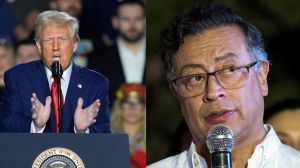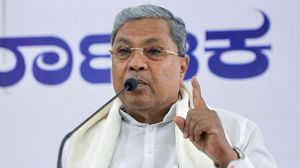Songs of and for the Republic
It8217;s that time of the year when patriotic film songs blaring from the neighbourhood club or school could be your wake-up call, whether or not you gather for that ritual unfurling of the national flag on the Republic Day morning.

It8217;s that time of the year when patriotic film songs blaring from the neighbourhood club or school could be your wake-up call, whether or not you gather for that ritual unfurling of the national flag on the Republic Day morning.
But their tug-at-heart impact apart, some of Bollywood8217;s all-time popular patriotic songs can also be credited for evocatively capturing the prevalent sentiment and the national drift of their times starting from Kismet8217;s 1943 8216;Door hato aye duniyawalon Hindustan hamara hai8217;. The emergence of Hindi cinema8217;s first cult patriotic song, after Gandhiji8217;s launch of the Quit India movement, wasn8217;t just a coincidence. The song was smartly incorporated by the film8217;s makers and got past the Censor Board, by confusing the colonial government of the day that it was targeted against Hitler. But once it became popular, the British government saw through the ploy and banned it. But it was too late by then.
Come the 8216;50s and the songs adopted a celebratory tone reflecting the hopeful mood of a newly independent nation. At a time when leaders of the freedom movement were nationally revered icons, onscreen patriotism too were fashioned as tributes. A case in point is the non-starrer surprise, the hit Jagriti 1954. While its 8216;De di hame azaadi bina khadag bina dhal8217; makes for a touching tribute to the father of the nation, Jagriti8217;s other popular song, 8216;Hum laaye hain tufanon se kashti nikal ke8217; urged young India to take over the reins of a ravaged nation and rebuild it. The patriotic tenor occasionally also went the idealistic way, endeavouring to achieve the dream of an inclusive society, including the weakest of the weak 8212; songs like 8216;Woh subah kabhie to aayegi8217; Phir Subah Hogi, 1958.
The developmental focus of the Nehruvian era too got echoed in songs like 8216;Chodo kalki baatein8217; Hum Hindustani, 1960 urging people to move away from the past and think big. But it was Kaifi Azmi8217;s 8216;Kar chale hum fidaa8217; Haqeeqat, 1964, on the betrayal and angst of a nation8217;s shock defeat in the 1962 China war that remains Hindi cinema8217;s most poignant ode to the soldiers till date.
When Prime Minister Lal Bahadur Shastri gave his 8216;Jai jawan, jai kisan8217; slogan, Bollywood8217;s self-appointed Mr Bharat, Manoj Kumar, made Upkar 1967 8212; a tribute to the farmer and the soldier. Upkar8217;s popular 8216;Mere desh ki dharti8217; further showed that patriotism can also be evoked beyond the call for sacrifice, and that the love for a country without any aggression can also make for an inspiring song. Manoj Kumar8217;s next, Purab aur Paschim 1970, adopted a patriotism with a preachy hue, reinforcing Eastern values in the face of the West8217;s perceived corrupting moral onslaught.
Onscreen patriotism, however, slowly went out of fashion in the eighties after Manoj Kumar stopped making his kind of movies. Subhash Ghai8217;s multi-starrer Karma 1986 was perhaps the last gasp. It reinforced the dying-for-the-nation act as the ultimate sacrifice, simultaneously making a reference to 8216;external forces8217; creating 8216;internal instability8217;. The latter theme caught Mani Ratnam8217;s creative imagination. In Roja 1991, he depicted the plight of a common man caught in terror8217;s web. When the film8217;s hero, Arvind Swamy douses a burning national flag set aflame by his terrorist captors by flinging himself onto it, the patriotic act was freed from being the prerogative of men in uniform alone. A.R. Rahman8217;s balladic 8216;Bharat humko jaan se pyara8217; playing in the background only heightened that impact.
But as the focus of the narrative of the late nineties shifted to a generation of Indians who had made it big abroad, patriotism adopted a tone of fond nostalgia a la Pardes8217;s 1997 8216;I love my India8217;. Terrorism intermittently kept surfacing through films like Sarfarosh 1999, with its title track 8216;Zindagi maut na banjaye8217; impressing upon a call to amity by purging the demons within.
Post-2000 films, like Swades 2004 and Rang De Basanti 2006, have further consolidated that introspective approach to patriotism. Picking RDB8217;s hit songs 8216;Roobaroo8217; and 8216;Khoon chala8217; as the voice for contemporary patriotism, its lyricist Prasoon Joshi reasoned that the songs, while being a call for duty and introspection, aimed to rekindle the ebbing passion for the country, especially among the youth. Swades8217;s 8216;Yeh jo desh hai tera8217; takes that reconnecting plea to the Indian diaspora, effectively tugging at the hearts of Indians abroad to return home and use their expertise for the country8217;s benefit.
Bollywood may have finally outgrown the cliche of the chest-thumping brand of bravado against Pakistan Gadar, 2001, and its myriad Sunny Deol spin-offs but we are still waiting for a more nuanced and inclusive portrayal of the country from the dream factories of the megapolis.
- 01
- 02
- 03
- 04
- 05































